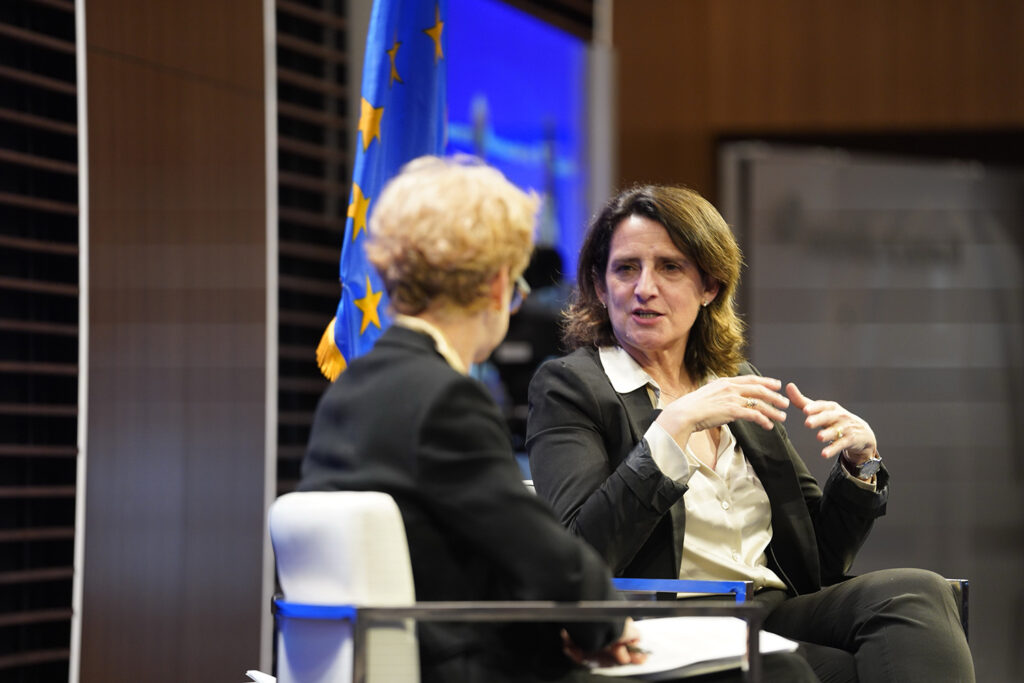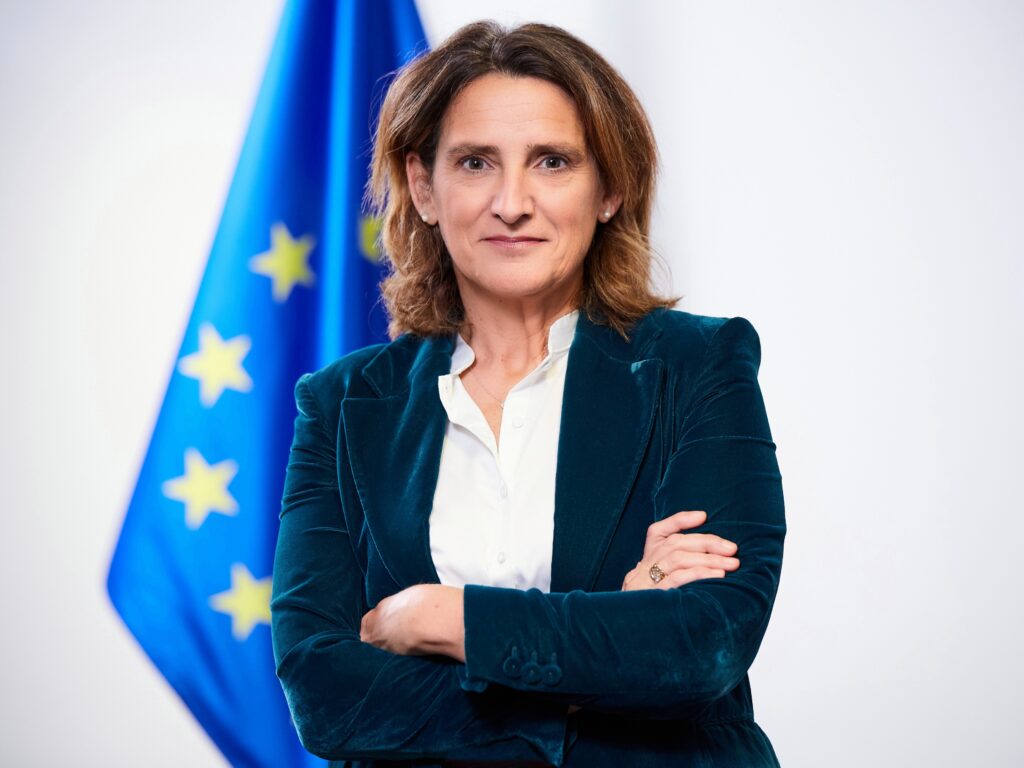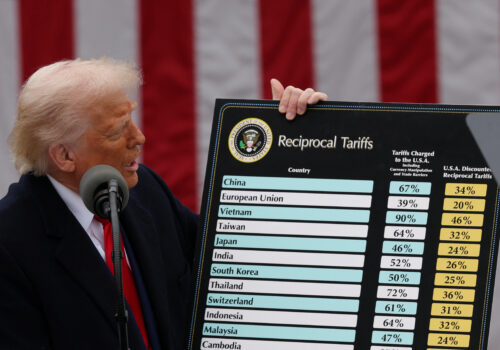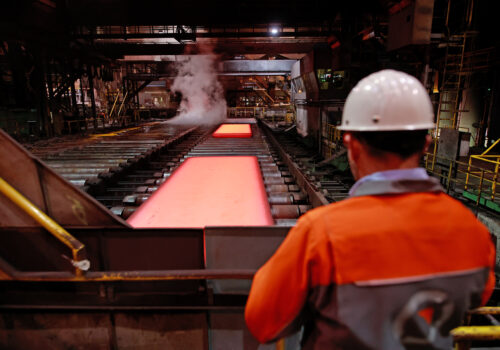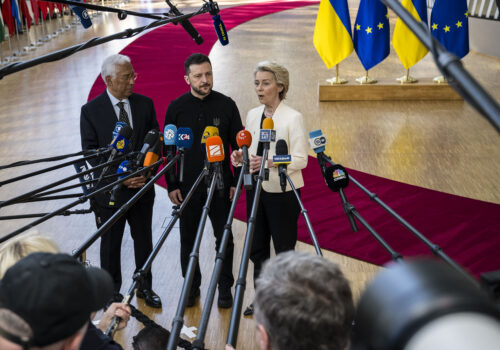Watch the full event
US President Donald Trump’s sweeping tariffs, announced Wednesday, are “bad news for the whole world—including Americans,” said Teresa Ribera, executive vice-president of the European Commission for a clean, just, and competitive transition.
“We will defend the Europeans,” from businesses to citizens, added Ribera at an Atlantic Council Front Page event Thursday. The European Union (EU) will first look to avoid a “big clash” with the United States. “We will remain firm and open,” and see if there are any avenues to “solve any type of misunderstanding and avoid conflict,” she said.
As for what the US tariffs mean for the EU’s trade strategy, Ribera said that the bloc will “keep on developing and deepening the relationship with the rest of the world.”
“The whole world is bigger, or larger, than the US market. So yes, of course, we will try to keep on building that,” she said.
She added that it is “worth it to defend” the “multilateral-order-based rules,” including ones around trade, that the EU has built with its partners “during the last eighty years.”
Below are more highlights from the conversation, moderated by Europe Center Distinguished Fellow Frances Burwell, which also touched upon the EU’s competitiveness agenda and green transition.
All for one . . .
- Ribera argued that in responding to the US tariffs, it will be important to have a “strong” EU that is “united” in a “common approach.”
- “I say that we are boringly reliable, but I think that it is absolutely true,” Ribera said. She pointed to the EU remaining together against Russian President Vladimir Putin’s attempts to divide it. “This is one of the most important principles we need to stick [with],” she said.
- She added that internal changes—such as removing barriers to trade within the European single market—could help offset losses incurred from US tariffs, seeing as internal trade barriers amount to the equivalent of a 45 percent tariff.
- Ribera noted that the US-EU trade relationship has come to be a “story of success” in joint cooperation, so the two parties should not look to weaken the relationship, but to strengthen it. “It’s good to count on supply chains that work, markets that work and are predictable,” she said.
- In order to address today’s challenges and address society’s demands, she said, “it is much [easier] to build bridges than to build barriers.”
Guided by a new “Compass”
- Ribera will soon review the EU’s competition policy, which regulates mergers and acquisitions. She said the policy has been built on a global situation that “has changed” with the power of the West diminishing in its ability to set the terms of global markets. She said she will identify how the tools can actually help attain a more competitive environment, in line with the EU’s new Competitive Compass.
- After US Federal Trade Commissioner Andrew Ferguson said that he was “suspicious” of the EU Digital Markets Act (which imposes restrictions on tech companies operating in Europe) and criticized laws that “get at American companies abroad,” Ribera argued that the act is “not intending to go against anyone.” She said, rather, it is intended to protect from the development of monopolies against new innovators in the EU market.
Clean, green machine
- In addressing criticism that the EU’s green push is getting in the way of achieving competitiveness priorities, Ribera said that the green framework can actually be a “main driver” of Europe’s future competitiveness.
- Other countries have come to realize the value of the green transition and now “have a big share of the international market dealing with green equipments,” she said. “We don’t want to miss the train anymore.”
- With the European Commission having proposed the Omnibus package of measures to simplify rules (such as those around sustainability reporting) for businesses, Ribera said that “simplification is very important.” She said she hears from businesses that they want simpler reporting obligations and more clarity from the EU to help them make the “right decisions” on investments.
- The EU must show investors and the industrial community that it will not go “back to the past to solve the problems of today,” Ribera said. “This is clean, this is industrial, but this is a deal,” she added, explaining that the deal means the EU will be “paying attention to where the concerns may be and how we can . . . [better] bring better everybody together.”
Katherine Golden is an associate director of editorial at the Atlantic Council.
Watch the event
Further reading
Wed, Apr 2, 2025
How Trump’s ‘liberation day’ tariffs will transform global trade
Fast Thinking By
Our experts share their insights on how US President Donald Trump’s sweeping tariffs will impact US trade partnerships and the global economy.
Wed, Mar 12, 2025
Experts react: The US and Europe are trading tariffs. What’s next?
New Atlanticist By
The White House on Wednesday imposed new tariffs on steel and aluminum imports, to which the European Union quickly retaliated.
Thu, Mar 6, 2025
How European leaders are responding to Trump’s approach to Ukraine and Europe
New Atlanticist By
From London and Berlin to Paris and Brussels, European leaders have taken several notable steps this week on security. This follows the blow-up between the Ukrainian and US presidents on February 28.
Image: Executive Vice-President of the European Commission for a Clean, Just and Competitive Transition Teresa Ribera speaks at an Atlantic Council event on April 3, 2025. Photo via the European Union.
